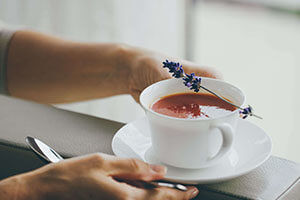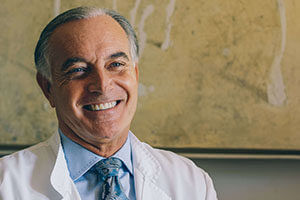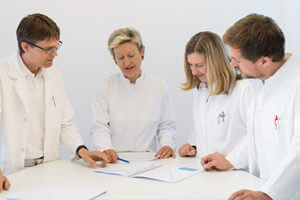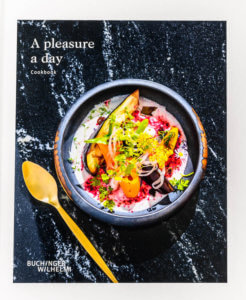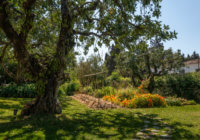BACK TO THE KITCHEN AT BUCHINGER WILHELMI
An interview with Hubert Hohler
Hubert Hohler is back! Together with Steve Flügge, he has returned to the kitchen at our Überlingen clinic. Indeed, he never really left, but used the time last year to develop the contents of our FASTING BOX. In the meantime, the role of head chef was filled by Philipp Troppenhagen, who is now pursuing a new professional challenge. So our previous head chef is now back at the chopping board: As manager and mentor to Steve Flügge, he is passing on his more than 25 years of expertise and making sure that everything we serve meets Buchinger Wilhelmi’s highest culinary standards – as well as tasting good, of course.
Mr Hohler, how does it feel to be back?
It feels great! Although it was nice to do something different after 25 years in the kitchen – and I really enjoyed creating the contents of the FASTING BOX – when I was asked whether I would like to return to the kitchen, I didn’t hesitate for a moment. It’s fantastic to be back – and it makes me realise just how much I missed it.

You and Steve Flügge are working together. How is that going? And who is responsible for what?
It’s going marvellously. We regularly compare notes and I hear from Steve that he feels the same. Roughly speaking, you could say that he is “home secretary” and I am “foreign secretary”. I see my role as a mentor, training our new chefs in the Buchinger Wilhelmi cooking method, among other things. I find it important that they understand why we use certain methods (for example, why we rarely fry food using fat, but add high-quality oils afterwards instead), because they will only apply these things if they understand why we do them.
There is a saying that comes to my mind: “If you want to teach someone how to build a ship, don’t show them the building plans, but instil in them a longing for the open seas.” What matters to me is that I can convey the joy of cooking. At the moment, our guests can also find me at the cooking demonstrations.

Steve has other areas of responsibility, like the duty roster and purchasing. He is increasingly the main contact for our farmers. I am very grateful to him for taking on these tasks, and am happy to pass on my knowledge to him, so that we can uphold the values we have developed over the past 25 years. It is important to us that there is room on the plate for our Buchinger Wilhelmi philosophy.
What Buchinger Wilhelmi values from the last 25 years are most important to you? What should not get lost under any circumstances?
The quality of basic foods is one of the most important things. At Buchinger Wilhelmi we always use the very best ingredients we can get, and we are fortunate that we are under no cost pressure. Another one is that food should be handled carefully – preserving its nutritional value during cooking, using as much of it as possible, and ensuring it is fresh. We know what our patients need and prepare dishes so that they offer the greatest possible health benefits. For example, if we make sure that the minerals are preserved, food automatically tastes better.
Another value close to my heart is our close ties in the region around the lake. We are very fortunate to be able to work with a large number of excellent farmers, who supply us with some very special products. We are continuously adjusting our recipes to account for this; our menu is not static, but changes from season to season. Sometimes, a certain ingredient might not be available, so we improvise. The fact that we have dietetic know-how in the kitchen means we can be much more flexible.
Can you tell us something about your new menus?
First, the dishes that are good should stay good. Buchinger Wilhelmi classics that are popular among our guests will continue to be on the menu. We have also taken over some great recipes from Philipp Troppenhagen, and often swap ideas with Fernando, our head chef in Marbella. But of course, we also adapt the menu to the seasons. For example, there will be some surprising creations on the menu during asparagus time, such as asparagus polenta, and in summer we will try out other dishes, too. We won’t change the whole menu at one go, but add new recipes now and again. And finally, we make sure that nothing gets thrown away, which means that our dishes are often linked.
For example, today we are serving asparagus with sautéed tomatoes for lunch. The tomatoes are chopped into fine cubes, put in a sieve, and left to drain. We then use the juice to make tomato jelly for a starter the next day.
We also try to have a lot of variation in the menu, so that everyone can find something to their taste. Guests who eat at Buchinger Wilhelmi embark with us on a journey around the world – from the Mediterranean to Asian countries, as well as typical German fare.
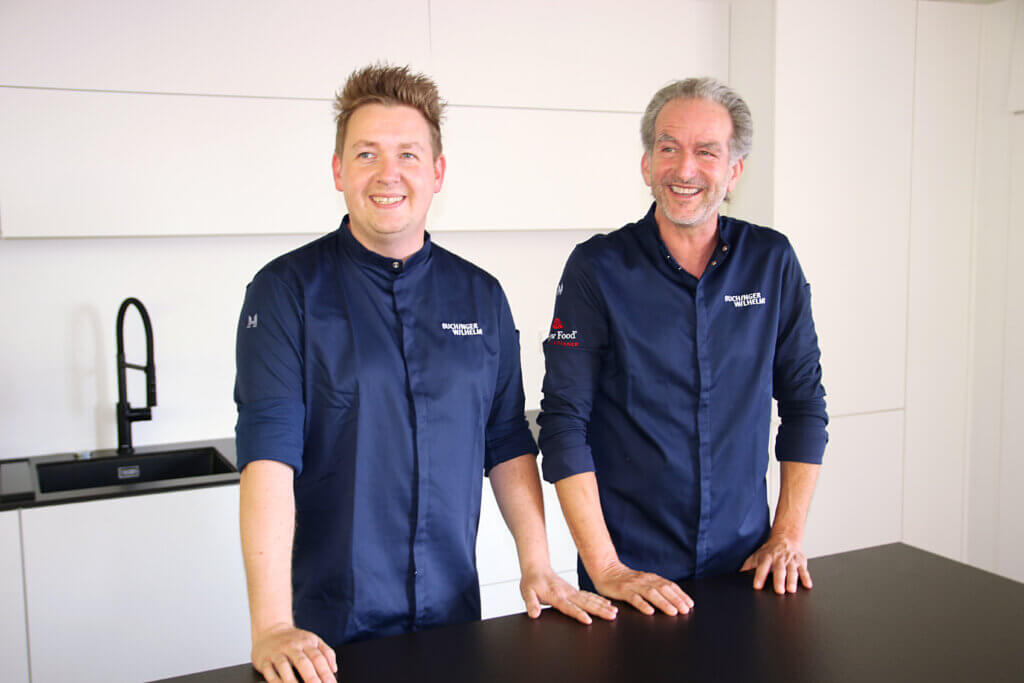
How do you ensure that the food served at Buchinger Wilhelmi is sustainable?
I use the Planetary Health Diet as a guide. According to this principle, human health is closely linked to the health of our planet and all living creatures on it. We buy our food directly from local farmers and make sure that at least 70% of it is certified by Bioland or Demeter. Because these labels promote soil fertility – one of the most important measures for sustainable farming. They also use seeds from pure lines (no hybrids), which is a guarantee for biodiversity.
In former times, people could not afford to eat certain food like meat every day. Today this is possible because it has become so cheap. But that also creates a problem. The people from the Planetary Health Diet have calculated how much of different types of food a person is entitled to eat. Based on this, they recommend one to two meals with meat per week. At Buchinger Wilhelmi we have thrown this overboard: Our menu is vegetarian, with fish only on prescription. We have also reduced the amount of dairy produce and eggs we use and try to replace them with vegan alternatives like vegetable broth and nut milk. The idea behind it is to keep people and the planet healthy. Fortunately, these two goals complement each other perfectly and are not at all contradictory!
In our kitchen, we don’t cook for the garbage bin. That means avoiding waste wherever possible: If there are leftovers, we put them in the biogas plant; we have found a sustainable alternative to conventional plastic foil; and when we bought a new dishwasher, we even made it more energy-efficient by recovering waste heat. So you see, we are constantly trying to make things better, and sustainability is one of the biggest factors in all our decisions.
To wrap up, do you have a summer recipe for our readers?
Of course! How about a summer mocktail?
Mocktail Mint Julep
Ingredients:
- 550 ml mint / rooibos tea
- 250 ml orange juice
- 12 pcs mint leaves
- 1-2 EL tbs apple verjuice
- 130 g ice cubes
Method:
Steep 1 rooibos teabag and 4 sprigs of mint in hot water for around 5 minutes and leave to cool. Mix the cold tea with the mint leaves and the apple verjuice, fill up with orange juice and serve with ice.




